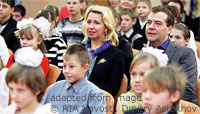Majority support Russian ban on US adoptions – polling agency

(Interfax – January 18, 2013)
Over 70 per cent of Russians support the recently adopted law which bans adoption of Russian children by US families, Interfax news agency reported on 18 January, quoting a poll conducted by the pro-Kremlin All-Russia Public Opinion Research Centre (VTsIOM). Details of the poll were posted on the centre’s website on the same day (http://wciom.ru/index.php?id=459&uid=113548). The survey was conducted on 12-13 January among 1,600 respondents in 138 towns and villages in 46 constituent parts of the Russian Federation.
Asked whether they have heard of the so-called Dima Yakovlev law which bans US citizens from adopting Russian children, 38 per cent of those polled said they were well familiar with the issue; 47 per cent, that they had heard of the law but did not know any details; 14 per cent, that they had never heard of it, and 1 per cent were unable to answer.
Further asked if they personally approved of the ban, 76 per cent of respondents replied in the affirmative, while 24 per cent said they did not.
Asked to explain their reasons (and allowed to choose as many options as they wanted), in the former group, 38 per cent of respondents ticked the “no answer” option; 24 per cent ticked the option “the state should itself bring up its children, children should stay in Russia”; while 18 per cent chose the option “foreign adoptive parents abuse our children”. The options “it is impossible to monitor what is happening to the children abroad” and that the Dima Yakovlev law was “a fit retaliation to the USA” for the Magnitskiy Act were supported by 5 per cent of respondents who approved of the ban. The options that Russian children “should be given to adoptive parents inside the country and the adoption procedure should be simplified” and that “children should not be used for mercenary purposes (to receive benefits, etc.)” were each chosen by 4 per cent of respondents in the first group, with the option “generally approve” and “other” chosen by 2 and 1 per cent of respondents respectively.
In the second group – of those who do no approve of the Dima Yakovlev law – 20 per cent chose “children should have a family, this is a chance to get a family” as their reason; 18 per cent ticked the option “state issues should be resolved by other means, without manipulating children”; while 11 per cent of respondents chose the options “foreigners adopt more children than Russians do” and “living standards in the USA are higher, there are more opportunities for children there”. The reason “foreigners adopt disabled children” was given by 10 per cent of respondents in this group, while the options “not all Americans are bad, there have been cases of child abuse in Russia too” and “this is a half-baked law, I do not approve” were picked by 8 per cent of respondents. The reason “it would be better to improve control over adoptive families” was chosen by 5 per cent, with 9 per cent of people in this group unable to give a reason.
The poll also included the question of whether the state should ban the adoption of Russian children by foreigners in general. The number of respondents who replied in the affirmative was 53 per cent, with 35 per cent replying in the negative and 12 per cent choosing the no-answer option. When the same question was asked in a poll in 2010, the results were 38, 48 and 14 per cent respectively, while in a 2005 poll they stood at 32, 61 and 8 per cent.
Commenting on the results of the VTsIOM poll later on the same day, political scientist Leonid Polyakov from the Higher School of Economics said, as quoted by Interfax news agency: “The figure of 76 per cent of respondents in favour of the law shows that the Sunday (13 January) opposition march in Moscow runs counter to the opinion of a vast majority of the nation. Those who took part in the march are marginalizing themselves and do not take into account the opinion of a clear majority. Therefore the decision of the State Duma, the Federation Council and the president, who have signed the law, clearly reflects the will of the nation.”
He continued: “As regards the opinion that foreign adoptions of Russian children should be banned, the figure of 53 per cent of respondents should not be viewed as a manifestation of xenophobia, as some are trying to interpret it. In many European countries and in North America, adoptions by foreigners are very complicated, if not banned. Most European countries believe that orphans should be adopted only by residents and live on the territory of their native countries. In that respect, the opinion of the majority of Russians is absolutely European, civilized and modern.” Polyakov added: “It clearly shows that we are beginning to value ourselves and to care about our gene pool and, consequently, view ourselves as a modern and civilized nation.”
The same Interfax report quoted another pundit, Yevgeniy Minchenko, commenting on the role the media had played in forming the public opinion on the issue of the adoption ban: “Those who supported ‘the Dima Yakovlev law’ are people who watch television and do not have any alternative channels of information. There has been a very tough campaign on TV and in official media in general to promote this law. Although, to be fair, it should be said that opinion polls that were conducted prior to that campaign too showed quite a high share of people who supported a complete ban on adoptions by foreigners, not just Americans.”
